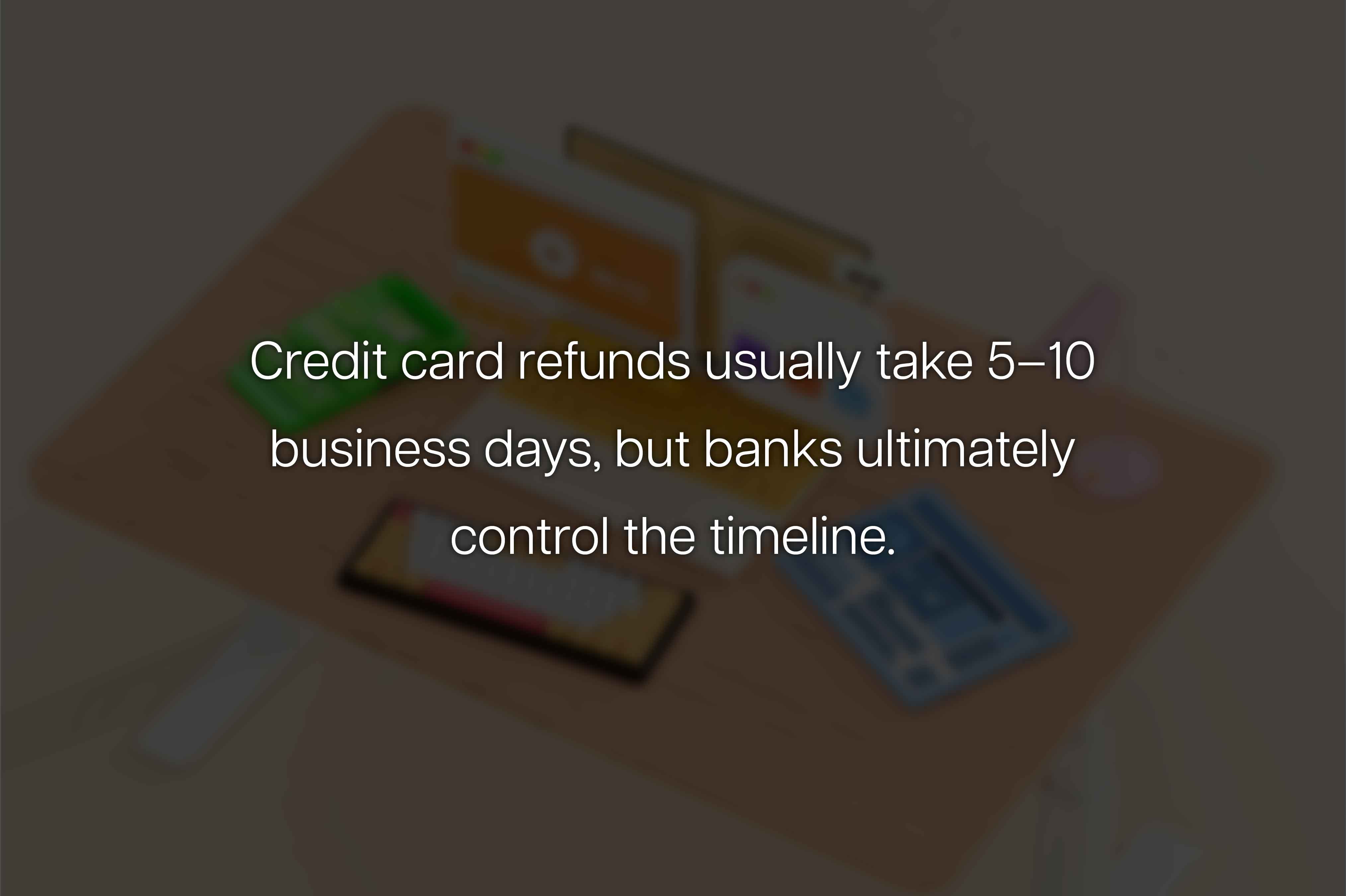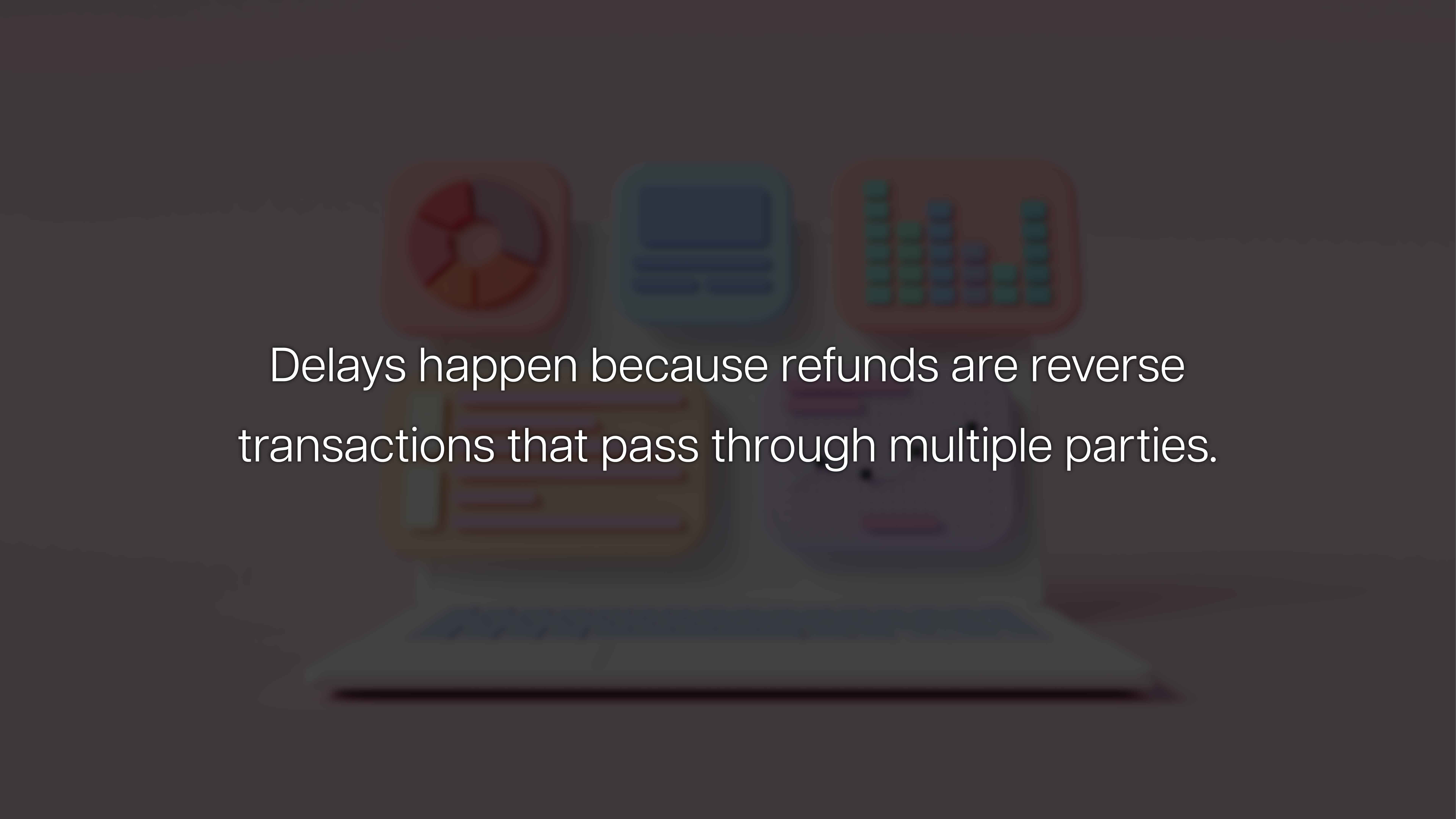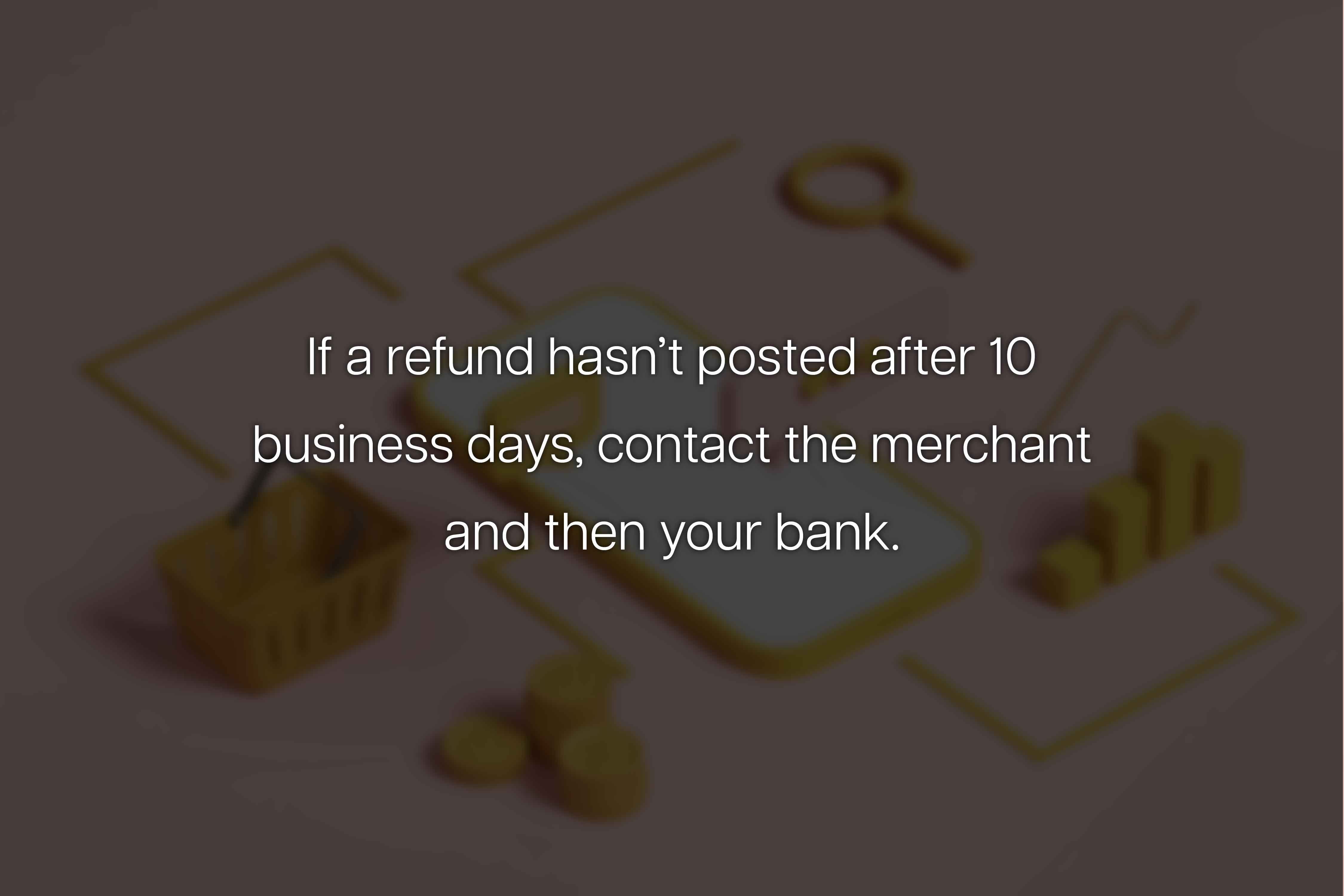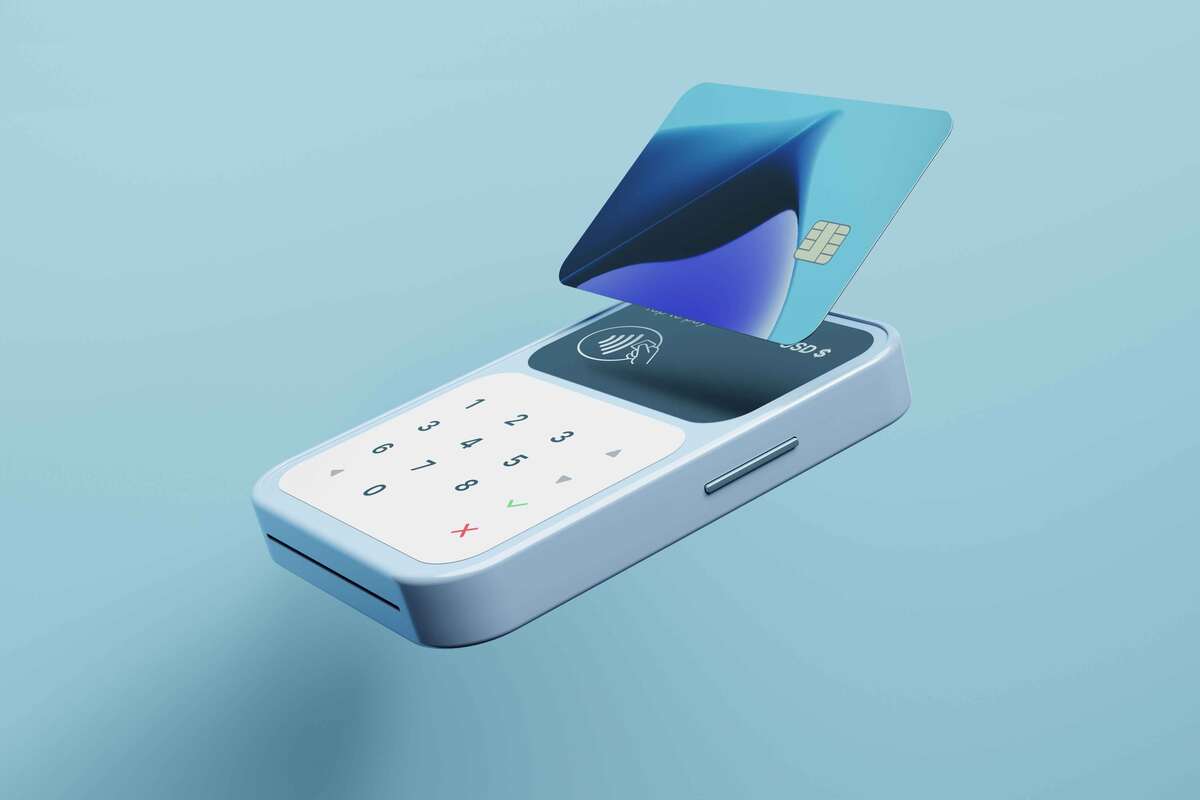How Long Do Credit Card Refunds Take to Process?
Credit card refunds typically take 5 to 10 business days to process, though the exact timeframe can vary depending on the merchant, the card issuer, and the nature of the original transaction. While the refund might be initiated quickly, the bank or card network still needs time to verify and return the funds.

No hidden fees. Ever.
Real-time accounting
SOC 1 & SOC 2 compliance
Expert human support

Table of Contents
Credit card refunds typically take 5 to 10 business days to process, though the exact timeframe can vary depending on the merchant, the card issuer, and the nature of the original transaction. While the refund might be initiated quickly, the bank or card network still needs time to verify and return the funds.

What Happens During a Credit Card Refund?
A credit card refund is not immediate. When a merchant issues a refund, the process involves multiple steps:
- The merchant authorizes the refund: They submit the request to their payment processor.
- The processor notifies the card network: Visa, Mastercard, or another network is informed.
- The issuing bank processes the refund: This is the cardholder’s bank, and it determines when funds are posted.
The bank may place a temporary hold or show the refund as "pending" before finalizing the credit on your account.
Why Do Refunds Take So Long?
Refunds take time because they are essentially reverse transactions. Unlike purchases, which are quickly authorized, refunds must go through checks and reconciliation by multiple parties. Delays can happen at any stage in the process.
In most cases, the merchant initiates the refund within 1–2 business days, but the issuing bank's policies often control how quickly the money is credited back to your account.

Factors That Affect Refund Timelines
Several variables impact how long it takes for a refund to be processed:
- Type of card: Credit cards often process slower than debit cards.
- Merchant's processor: Some platforms batch refunds daily instead of instantly.
- Weekends and holidays: Non-business days don’t count toward the processing window.
- Bank policies: Issuing banks have different internal timelines for releasing funds.
Average Refund Timelines by Source
Different companies and payment providers have different expectations for refund timelines. Here’s a general breakdown:
- Amazon: 3–5 business days after the return is received
- Apple: Up to 10 business days
- PayPal (credit card payment): 5–30 days depending on the card issuer
- Stripe or Square refunds: Usually processed in 5–10 business days
How to Track a Credit Card Refund
If you’re waiting on a refund, you can take a few steps to monitor progress:
- Check the merchant’s confirmation email: Most include refund timelines or transaction IDs.
- Look for “pending” transactions: Some banks display pending refunds before they post.
- Call your credit card issuer: They can confirm if the refund has been received or is still in process.
What If the Refund Doesn’t Arrive?
If a refund hasn’t appeared after 10 business days, you should take action. Start by contacting the merchant and asking for the refund transaction number. If they’ve processed it, the delay is likely with the issuing bank. If not, they may need to reinitiate the refund.
Common delays include:
- Merchant error: The refund was never actually submitted.
- Processor error: Refund failed to transmit correctly.
- Bank backlog: The issuing bank is slow to update your account.
You may need to escalate to your credit card issuer with proof of the refund attempt.

Can Refunds Post to a Closed or Canceled Card?
Yes, credit card refunds can still post to closed or canceled cards. If the account is closed but still active internally, the refund will credit the account balance. If the card account is fully closed, the bank will generally issue you a check or redirect the funds to your new card.
If your card was replaced due to fraud or expiration, the refund still applies to your account—it may just take longer to show.
How Refunds Affect Your Credit Limit and Statement
Refunds restore your credit limit but may not reduce your current statement balance right away. For example, if you were refunded $100, your available credit may immediately increase by that amount, but your statement might not reflect it until the next billing cycle.
If you already paid the statement that included the original charge, the refund may appear as a negative balance, which will be applied to future purchases or refunded to you upon request.
What About Chargebacks vs. Refunds?
A refund is issued voluntarily by the merchant. A chargeback is a reversal forced by your card issuer after you dispute a charge. Chargebacks typically take longer to resolve and require additional documentation.
Always try to obtain a standard refund before initiating a chargeback, as chargebacks can negatively affect the merchant and may not always succeed.
Quick Tips to Speed Up Refund Resolution
You can minimize delays and confusion with the following practices:
- Keep your original receipt or order confirmation
- Request refund confirmation via email
- Monitor your account daily for changes
- Contact the merchant first before disputing with your bank
Summary
Most credit card refunds are processed within 5–10 business days, but timelines can vary due to card type, bank policies, and merchant response times. Always confirm the refund has been initiated and contact your issuer if the credit doesn’t post within 10 business days.
Supercharge your Payments
RevitPay is here to help you scale smarter — from your 1st transaction to your 100,000th.
Previous
Next
Frequently Asked Questions
Recent Articles
A Seamless Start to Smarter Payment Processing
Request an Application
Submit for Approval
Start Processing
Explore More Online Payment Solutions
Everything you need to process payments wherever, whenever.
Seamless & Secure Payment Processing
Payment Methods That Power High Risk Businesses
We offer a wide range of secure, flexible payment methods tailored to the needs of high risk merchants. From credit card processing and mobile payments to ACH, eCheck, and more, our solutions are built to help your business accept payments confidently.
Credit Cards
Fast, familiar, and essential.
Give your customers the convenience of paying by credit card while maintaining the fraud protection and flexibility high risk merchants need.
Mobile Payments
Payments on the go.
Whether in-store or remote, accept transactions via smartphones and tablets, keeping your business agile and responsive.
Bitcoin & Crypto Payments
Stay ahead of the curve.
Expand your payment options to bypass traditional banking barriers and get paid faster—with global reach and fewer limitations.
MOTO Payments
Mail and telephone orders made easy.
Process card-not-present transactions securely with MOTO functionality, ideal for businesses that take payments by phone or through manual orders.
ACH Payments
Lower fees, higher reliability.
Automated Clearing House (ACH) payments are perfect for recurring billing or high-ticket items, offering a secure, bank-to-bank alternative to cards.
eCheck Payments
Modernize check payments.
Accept digital checks with ease, streamlining your processing while reducing risk and delays often associated with traditional paper checks.
Seamless Continuity Billing for Subscription-Based Businesses
Looking to support subscription models? Our Continuity Subscriptions solution offers automated recurring billing, built-in autobill features, and reduced payment churn—perfect for businesses that rely on predictable revenue.

Find the Right Way to Get Paid
Whether you’re running an online store, accepting payments remotely, or operating in a high risk space, RevitPay gives you the tools to process transactions with confidence and ease.
A Seamless Start to Smarter Payment Processing
Request an Application
Submit for Approval
Start Processing
Ready to get started?
Join businesses who are saving thousands each year with RevitPay.





